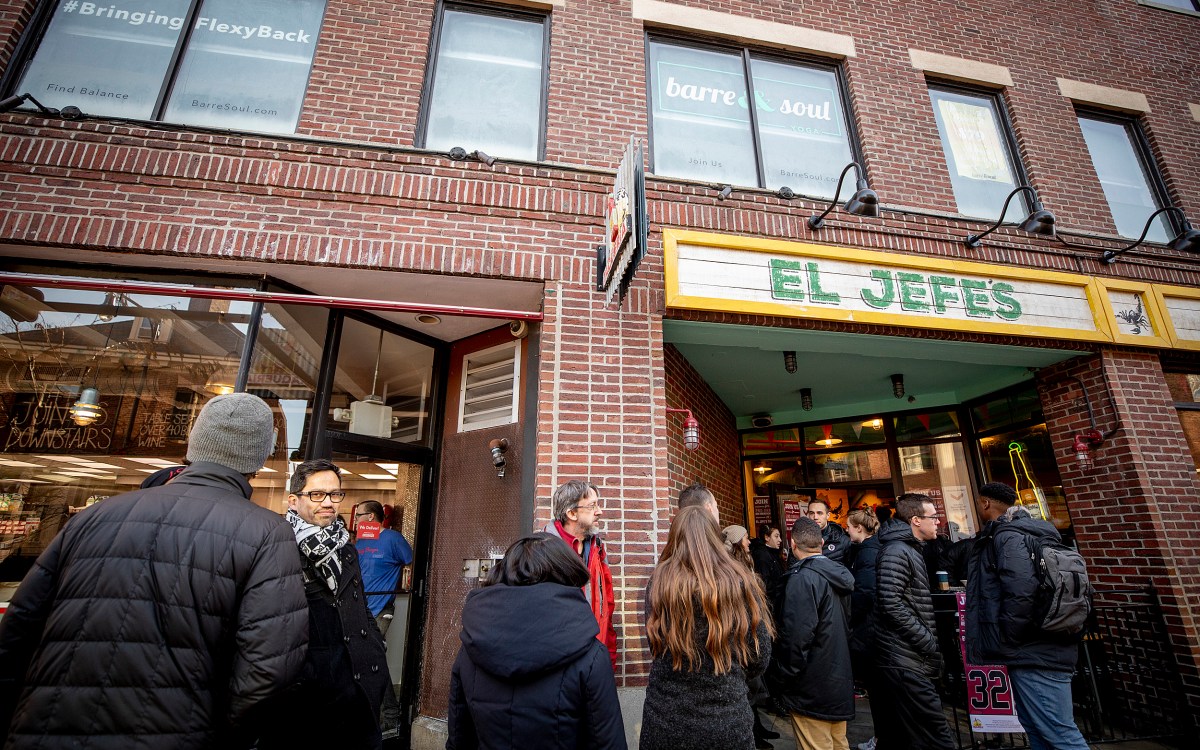A warrior then, a warrior now
Twice a week, Ben Abercrombie works out at a therapy center for people with spinal-cord injuries. “They’re always pushing me as hard as I can go … It brings back old football days of hard work … and just the mindset to keep pushing and never give up.”
Video by Justin Saglio/Harvard Staff
After spinal-cord injury left him paralyzed, Ben Abercrombie returned to finish what he started and battle to get back what he lost
Ben Abercrombie wants you to know that he’s back.
Abercrombie, originally a member of the Class of 2021, was left paralyzed after being injured in his first game as a Crimson football player in September 2017. He fought like hell to get himself ready to return to campus, and is now continuing that battle to reach all the physical and academic goals he has set for himself. Period.
“I’m determined to get back up,” Abercrombie declared from the custom electric wheelchair he uses to navigate campus, a gift from the many friends and believers who have held numerous fundraisers on his behalf, including one coming up Dec. 7 at El Jefe’s.
“I’m definitely going to try to get back up and be the best I can be.”
A celebrated football recruit from Alabama, Abercrombie came to Harvard in the fall of 2017. He suffered a severe cervical spinal-cord injury during a routine tackle in the away season opener against the University of Rhode Island. The hit broke his C-4 vertebra, dislocated his C-3, damaged his phrenic nerve, and left him paralyzed from the neck down and dependent on a ventilator.
Abercrombie spent the next two years with a goal of returning to Harvard. In 2019, he did, and he is now working toward a degree in economics. He hopes to become a financial manager for professional athletes when he graduates.
He is also set on making a recovery. A full recovery.
“Because why not?” Abercrombie said. “Why would I want to be in the chair for the rest of my life? I mean, if that’s what God has in store for me — that I’ll be in the chair for the rest of my life — then so be it, but I’m definitely going to try to get back up and be the best I can be.”
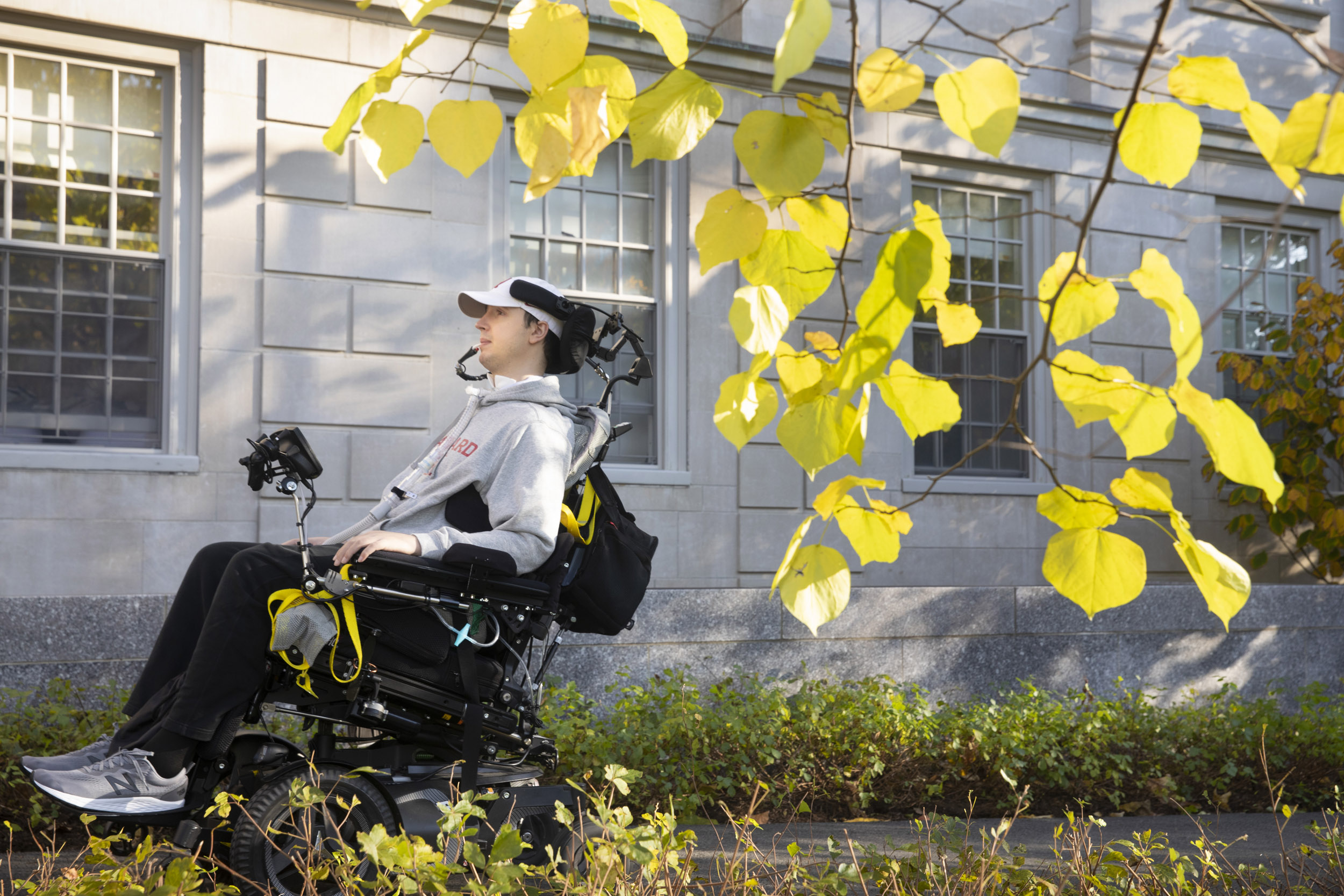
Abercrombie navigates campus using a custom electric wheelchair that was a gift from the many who have held fundraisers on his behalf, including one coming up Dec. 7 at El Jefe’s.
Kris Snibbe/Harvard Staff Photographer
To those who know him, his effort speaks to the unrelenting drive that’s always been there.
“He just doesn’t let hurdles prevent him from getting to his ultimate goals,” said Abercrombie’s father, Marty Abercrombie, a restaurant manager from Hoover, a suburb outside Birmingham.
Tim Murphy, the Thomas Stephenson Family Head Coach for Harvard Football, said it was this kind of attitude and perseverance that impressed him when he helped recruit Abercrombie from Hoover High School. It still impresses him.
“Now more than ever Ben’s work ethic and resiliency are evident on a daily basis,” said Murphy, who meets with Abercrombie weekly. “Even with such a great family and support team, nothing comes easy. Everything is a grind, and yet never a discouraging word … I have never seen any ‘woe is me,’ any self-pity from Ben, and that speaks volumes of his character and resiliency.”
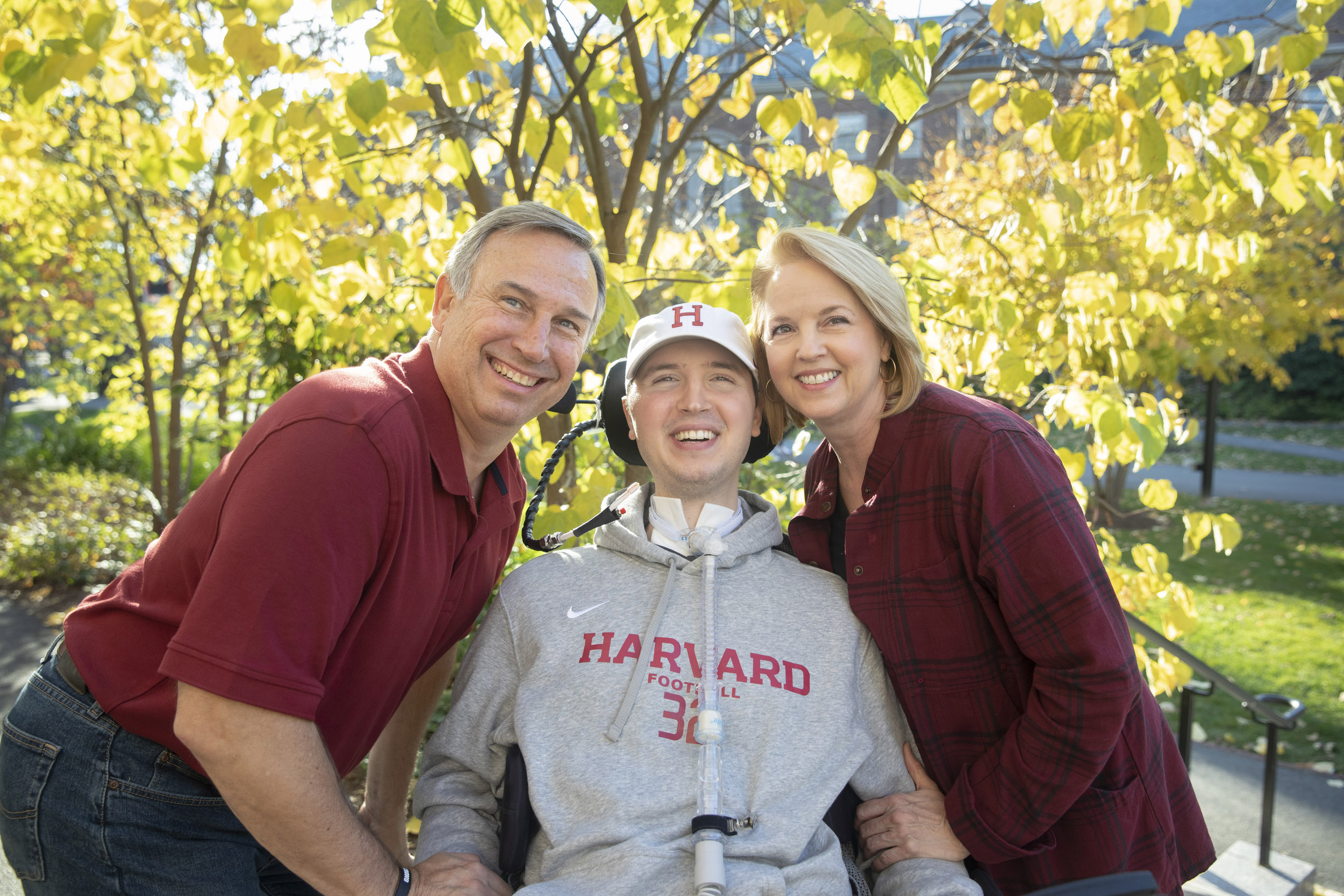
Abercrombie lives in a modified suite in Winthrop House with his parents, Marty and Sherri, who is a registered nurse. His parents recently took over all of his care because the pandemic made recruiting nurses harder.
Kris Snibbe/Harvard Staff Photographer
Abercrombie has been taking two courses a semester since his return. He is determined to graduate, this time as a member of the class of 2023. This semester he is taking microeconomics and a course on Greek mythology.
For the most part, Abercrombie says his return to Harvard has been what he expected. “It’s definitely busy. The classes can be difficult … But it’s Harvard,” he said with a shrug and a smile. “It’s a fun experience and feels good to get things rolling again.”
One of the most difficult parts of being back in School has been getting his schedule right, he said, because of the hours of daily care and physical rehabilitation he requires. But he and his parents, who live on campus with him, have developed a routine:
Up about 7 a.m., he is put in a specialized vest, then given a nebulizer treatment to clear his airways. After catching up on ESPN and eating breakfast, he does range-of-motion exercises to keep his joints from stiffening. This happens twice a day. On days he doesn’t have his 10:30 a.m. economics class, showering comes next, and then he’s back in bed to warm up.
“People with spinal cord injuries, they have trouble regulating their temperature,” Abercrombie explained. “So out of the shower, I’m all wet and cold, and so they’ll put me back in bed and just give me a few blankets so I’ll warm up.”
The morning routine takes about three to four hours. Lately his parents have had to take over all of his care because the pandemic made recruiting nurses harder. Whatever class he has that day determines what time he heads out, what homework he does, and sometimes which tutoring session and professor he meets.
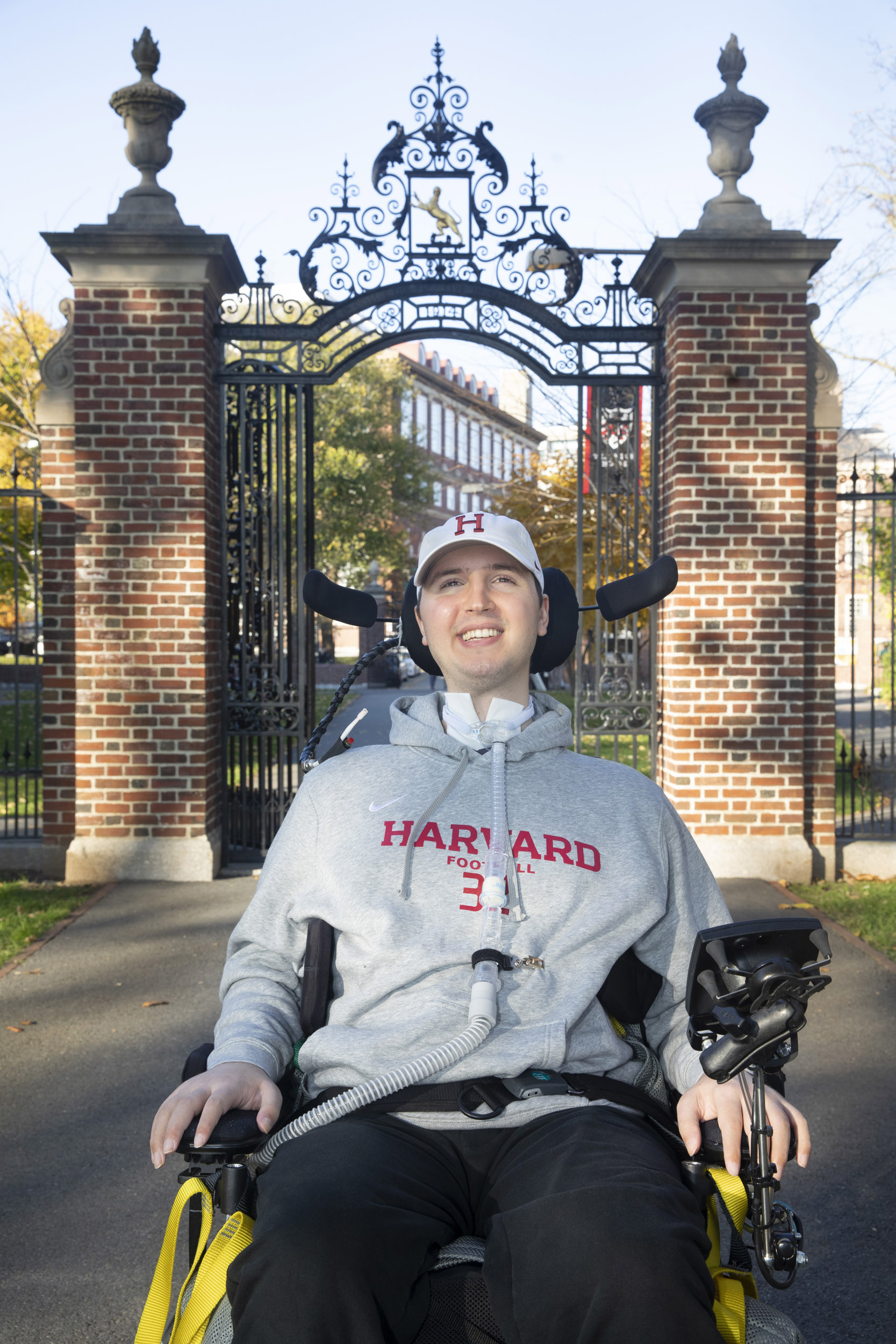
“A good day is getting all my goals accomplished. It’s nice to keep a fast, steady pace.”
Kris Snibbe/Harvard Staff Photographer
Some days he has chiropractor appointments at the Harvard Athletics Complex, and twice a week he works out at Journey Forward, a therapy center about a half hour away in Canton, Mass., for people with spinal-cord injuries. The workouts are mainly to keep his muscle tone intact with the hope that his body will eventually recognize the signals his brain is sending and generate recovery or movement. In 2019, he was able to walk on a robotic treadmill called a Lokomat for the first time.
Ever the athlete, it’s at these rehab workouts where Abercrombie truly comes alive, often smiling as trainers put him through exercises like helping him furiously rotate an arm cycle machine or standing him up on a power plate machine for a whole-body vibration.
“They’re very knowledgeable. They’re not afraid to put their hands on me,” Abercrombie said. “They’re always pushing me as hard as I can go to make sure I get the most out of the exercise we are doing. … It brings back old football days of hard work … and just the mindset to keep pushing and never give up.”
Abercrombie also has a specialized exercise bike in his room. He tries to get on it at least three times a week when he has the time. “That’s pretty much like the whole productive part of the day,” Abercrombie said.
Ben’s evening routine starts around 6 p.m. when he stands up for an hour in his wheelchair. Dinner comes next, and he’s in bed around 8:30 p.m. for more exercises, another respiratory treatment, and hour-long breathing exercises on a ventilator. The nighttime routine lasts usually well past midnight.
“A good day is getting all my goals accomplished,” Abercrombie said. “It’s nice to keep a fast, steady pace moving so I can get everything completed to where I can get some sleep. And my parents need some sleep, too.”
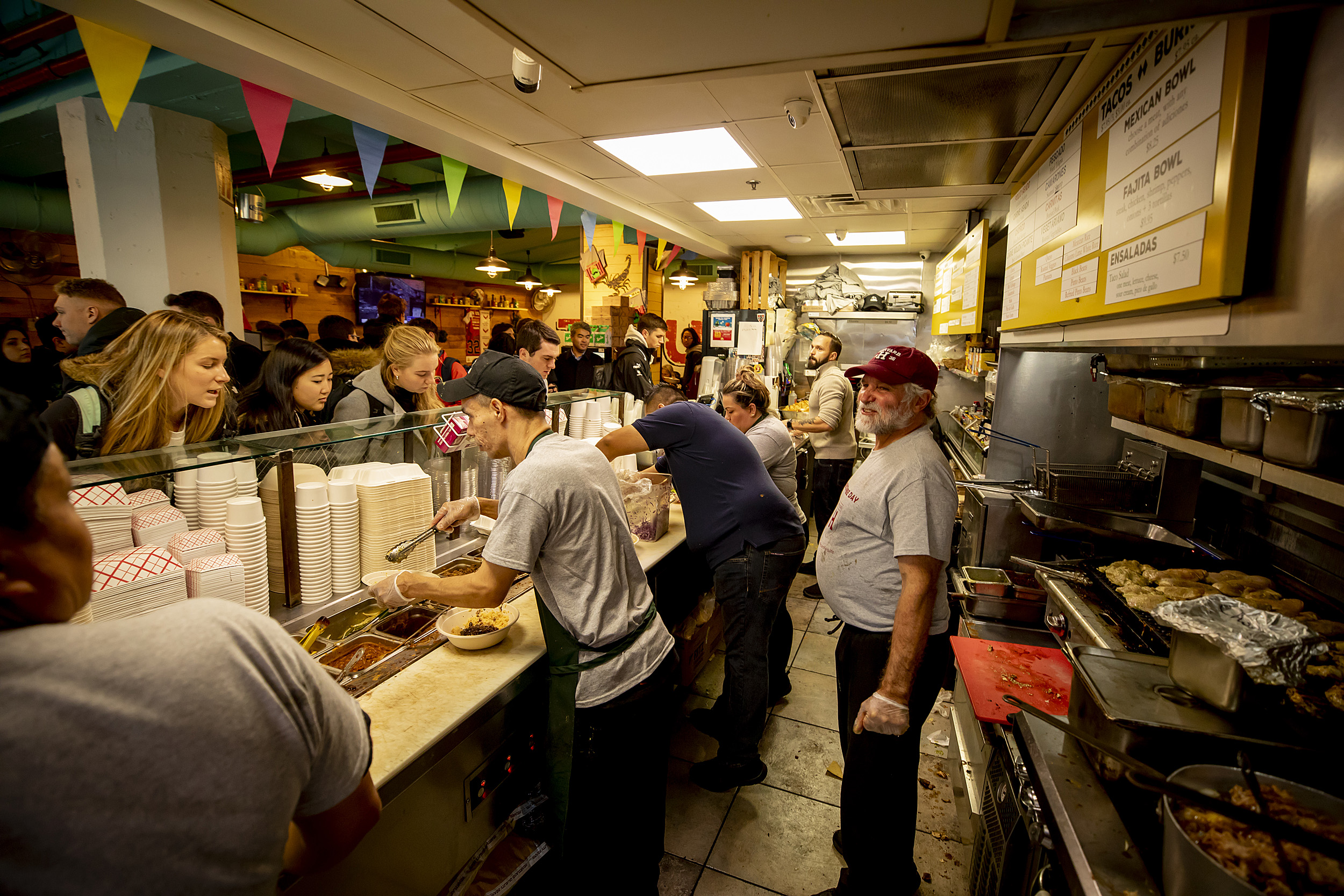
John Schall, owner of El Jefe’s Taqueria in Harvard Square, hosts an annual fundraising day when all revenue from sales and donations goes to the Benson M. Abercrombie ’21 Fund. This year’s is set for Dec. 7.
File photo by Rose Lincoln/Harvard Staff Photographer
Abercrombie and his parents live at Winthrop House.
“Obviously, we’re a bit closer,” said Sherri Abercrombie, who is a registered nurse. “We spend all day together so we’re mother and son and caretaker and (hopefully) friend.”
Her assessment seems right. The two at times banter playfully with one another. After his mom finished adjusting the position of his wheelchair, Abercrombie wasn’t so sure he was perfectly upright.
“My mom says I’m straight no matter what,” Abercrombie said.
“It’s ’cause I’m tired of adjusting!” she shot back, laughing.
In 2019 and early 2020, the mother-son duo split a suite in Weld Hall that was modified by Harvard’s Accessible Education Office, which also made sure the buildings where Abercrombie had class were wheelchair-accessible. The suite at Winthrop House has also been modified.
Separated by a hallway, Abercrombie’s half of the Winthrop suite has a mix of medical supplies and dorm decor, complete with posters of sports teams, pictures of himself or friends, a large flat-screen, and flags. In the room there is also a hydraulic, full-body lift used to help transfer Abercrombie from bed to wheelchair. It was purchased by Harvard College and will be made available to another Harvard student who needs it after Abercrombie graduates.
Abercrombie said he and his parents have slowly started adjusting to living in a dorm again after 18 months of remote learning. During the pandemic, the family said they were extra careful because of Abercrombie’s added risk of COVID-19, and spent time only with close family and friends. Abercrombie rehabbed at home with a trainer.
Like most students, Ben has been excited to be back on campus. “It’s been good to be back and actually meet with professors and things like that and meet new people around in the hall of my dorm and in my classes,” he said.
His parents say that even when they are walking around campus without their son, people ask them how he is doing. It speaks to the support the Harvard community has provided since the injury, the family said.
“I couldn’t ask for better support. I’ve been truly blessed by everybody here and back home in Hoover.”
John Schall, owner of El Jefe’s Taqueria in Harvard Square, hosts an annual fundraising day when all revenue from sales and donations goes to the Benson M. Abercrombie ’21 Fund. Former teammate Raishaun McGhee ’17 started a yearly Bowl for Ben event that also donates all proceeds to the Abercrombie Fund.
More like this
The fund, started by the Harvard Varsity Club, has raised more than $600,000 to date and has paid for a number of medical costs not covered by insurance, ranging from a customized van and wheelchair to sessions at Journey Forward and flights for treatments and doctors’ visits. Last year, the Varsity Club started an annual 5K for Abercrombie, as well.
“I couldn’t ask for better support,” Abercrombie said. “I’ve been truly blessed by everybody here and back home in Hoover.”
Abercrombie knows his body has a long way to go. He and his family stay abreast of the most current spinal-cord research, and regularly meet with doctors about treatments that could help him. They hope he can qualify for experimental treatments. His immediate priority is getting off the ventilator, and he has had procedures to help with this.
“It’s like I can feel my muscles, but they just don’t want to move,” Abercrombie said. As it is with anyone who’s suffered a spinal-cord injury — especially one as grave as Abercrombie’s — it could take years to see results, if any.
Still, Abercrombie says he will push through any dark personal moments he may have, and never relent on achieving his goal.
“I have faith in God and know that I will be healed eventually,” Abercrombie said. “It’s just a matter of time.”
Contributions to the Harvard Varsity Club’s Benson M. Abercrombie ’21 Fund can be made here. On Dec. 7 El Jefe’s in Harvard Square is holding the fourth Annual Ben Abercrombie Day. All of the sales that day, including digital gift cards, will be donated to the fund.



